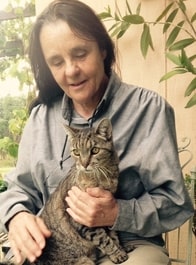
This article will help you understand why your cat has abnormal feeding habits. It could be your cat has a mental condition called psychogenic abnormal feeding disorder.
If your cat is going crazy for food, it could be due to a psychogenic cause. Psychogenic means the cat has a mental health problem underlying the abnormal feeding behavior.
Psychogenic feeding abnormalities in cats seems to be linked to stress early on in the cat’s life, or a learning disoder.
However:
If your cat suddenly develops a massive appetite or starts getting aggressive around food, take it to a veterinarian for a full medical check-up as soon as possible.
Meanwhile, here are details about the most likely causes of abnormal feeding behavior in cats.
1. Psychogenic Abnormal Feeding in Cats
A good example is if you adopted a feral cat, it might be obsessed with food because it was malnourished or hungry a lot when it grew up.
If you have several cats, they may feel stressed from competition for food, especially if they were malnourished at some point in life.
Psychogenic abnormal feeding behavior in cats is actually not the most likely cause of an eating disorder in cats.
One of the other conditions listed later in this article is more likely the reason a cat is eating abnormally.
But here’s information about psychogenic mental health problems some cats have.
Cats with a mental health eating problem often show these symptoms:
- Aggressive behavior around food
- Hissing and growling when eating
- Guarding of food bowl
- Stealing food
- Never appearing satisfied after eating
A scientific study published 2012 in the Journal of Veterinary Behavior described this problem for the first time.
The cat that got the first diagnosis of psychogenic abnormal feeding behavior was an eight-month old Siamese male cat named Otto.
Otto suddenly started jumping on the table and stealing people-food after he finished his own meal. He was also aggressive and stole food from other pets in the house.
Otto also engaged in pica, a condition where a cat eats or chews on non-food items like string, electric cords, or rocks.
The veterinarians who treated Otto first ruled-out any medical cause for the problem by doing blood and urine tests and a physical exam.
Otto acted crazy every time he was around food, but no medical cause was found by the doctors who examined him.
Otto suffered from a lot of stress early in his life. The vets who treated him believed this was part of the reason for his abnormal feeding problems.
The veterinarians prescribed the following treatments for Otto:
- Lowering his stress levels
- Asking owners not to eat in Otto’s presence
- Giving him affection when he acted calm
- Scheduled feeding and playtime
- Ignoring him when he begged for food
It took five months of the new routine, but in the end, Otto calmed down around food and started eating like a normal cat.
Another Case of Psychogenic Feeding in a Cat

One person described his cat’s crazy eating habits like this:
The cat always acted hungrily and begged for food, even right after he ate. It broke into the pantry and ate granola bars, stole food out of people’s hands, and acted aggressively whenever it was near food of any kind.
The cat also pushed other pets aside to get at their food bowls and even scratched and bit the owner’s hand while he was trying to take cat food out of the bag.
The cat had lots of toys and stimulation and was not lacking for attention or care. It also did not have any signs of a physical illness.
It turns out, this kitty also had a rough start in life as a feral cat, and it appears that high levels of stress or abuse early in life can make a cat go crazy about food.
If this sounds like your cat, talk to a veterinarian first to make sure there is no disease going on. You might also want to consult an animal psychologist or animal trainer for specific help for your pet.
Stress is one cause of psychogenic abnormal feeding in cats. Another possibility is a learning disorder. Let’s go into this in the next list item.
2. Cats Can Learn Abnormal Eating Behaviors

Eating disorders in cats can be a result of a learning problem.
If you give your kitty food from the table or pop open a can of food every time it meows, you are rewarding its behavior. Your cat may learn to beg for food. It can learn to beg even when it isn’t hungry.
Once a cat learns to beg for food, it can be hard to undo the problem. But it can be done, as long as you are persistent.
First, establish a designated place and food bowl for feeding your cat. Never feed them on the table.
Also, make a schedule for feeding wet food, or leave dry food in a bowl for your cat to eat when it wants.
Never feed the cat in any other location or time.
I had to do this with my cat when I recently switched from her from high-protein dry food to a lower-protein wet food.
My kitty loves the wet food, and she’d probably weigh 40 pounds by now if I gave it to her whenever she wanted it.
But she only gets a serving of wet food once in the morning before she goes outside for the day and another in the evening when she comes in for the night.
The rest of the time, my cat has dry food so she can eat whenever she wants.
If she begs, I ignore her or put her outside. It’s hard sometimes, but she is learning that meowing does not get her any extra food.
If you are trying to change the behavior of a cat, the most important point is never to give in or make an exception to your feeding rule. I did that a few times and then had to start over.
If you give in to the begging, even once, you will reward it for bad behavior. This teaches the cat that begging is a good way to get a nice treat, as long as it keeps on meowing or acting-out.
The solution to a learned eating behavior in a cat is:
- Set a schedule and location for feeding
- Never feed at any other time or place.
Abnormal feeding behaviors in cats have multiple causes.
Among them are:
- Psychogenic (mental health) causes
- Learning problems
- Thyroid and kidney conditions
- Diabetes
- Stress
- Nutritional deficiencies
- Lack of stimulation
- Intestinal worms
And we will go into them later on down the page
Hyperthyroidism Can Cause Cats to Overeat

Medical conditions are the most likely cause of a cat eating too much. Hyperthyroidism is a common medical problem in cats related to feeding behaviors. Older cats are more likely to develop this problem.
The thyroid is a gland that controls metabolism, including appetite. When the thyroid produces too much thyroid hormone, the cat feels hungry all the time.
If your cat has too much thyroid hormone – a condition called hyperthyroidism – it might have the following symptoms along with a ravenous appetite:
- Weight loss
- Dull coat
- Peeing a lot
- Hyperactivity or aggressiveness
- Drinking lots of water
If your cat has these symptoms along with a bottomless desire to eat, take it to the vet as soon as possible.
Thyroid problems are diagnosed with a blood test.
Treatments for hyperthyroidism in cats include:
- Medicines to reduce thyroid levels
- Surgery if there is a tumor
- Iodine treatments
- Prescription thyroid diets
Each of these remedies has its pros and cons. Discuss the options with a veterinarian if your cat is diagnosed with a thyroid condition.
Diabetes Can Cause Abnormal Feeding

Cats can get diabetes, and about 1 in 400 cats are diagnosed with this disease.
The cause of diabetes is too little insulin produced by the pancreas. Insulin is the hormone that keeps blood sugar levels in-check and appetite under control.
Many of the symptoms of feline diabetes are similar to hyperthyroidism and include,
- Eating a lot
- Losing weight
- Dull coat
However, diabetes in cats also often causes
- Lack of energy
- Weakness in the back legs
If your cat has some or all of these symptoms, take it to a veterinarian for a check-up right away. The vet will do a blood and urine test to figure out if the cat has diabetes or another disease.
Cats can live normal lives if they have diabetes, as long as the owner provides the right type of care. This includes:
- Feeding a low-carbohydrate diet
- Oral medications to increase insulin, or
- Daily insulin injections by owner
Many owners of cats with diabetes find that it is easier to give their pet a daily injection than to make it swallow a pill.
If you have ever had to shove a pill down your kitty’s throat, you know what I’m talking about.
If feline diabetes is detected early, many cats are successfully treated with a daily medication and a change in diet.
Kidney Diseases and Eating Disorders
Kidney disease and urinary tract infections in cats can also cause eating disorders. However, these diseases are most likely to result in anorexia, not overeating.
Besides a loss of appetite, other symptoms of kidney disease in cats are:
- Drinking a lot
- Vomiting or diarrhea
- Lethargy
- Blood in urine
- Ammonia smell in their breath
There are many causes of kidney disorders, and this is a serious and life-threatening condition for a cat.
Take your cat to a veterinarian right away if you see signs of kidney disease.
Stress-Related Hyperglycemia and Abnormal Feeding

Hyperglycemia is similar to diabetes, but it’s not exactly the same. Both conditions share the problem of too much blood-sugar.
However, hyperglycemia can be caused by stress, and diabetes is caused by problems with the pancreas not producing enough insulin.
Stress-related hyperglycemia in cats can cause them to eat too much. Other symptoms are:
- Drinking a lot of water
- Peeing a lot
- Weight gain or weight loss
- Lethargy
- Wounds that don’t heal
- Dental and other infections
Cats can develop hyperglycemia from stressful events. Stressful events for cats include:
- Bathing
- Fireworks
- Surgery
- Home remodeling
- New babies in the home
Drug interactions, including heartworm medications, can also lead to hyperglycemia in cats. So can eating foods high in glucose, a form of sugar.
Hormonal changes from pregnancy, kidney and urinary tract infections, and acute pancreatitis are other conditions linked to hyperglycemia and abnormal feeding behaviors in cats.
Older cats are more likely to develop stress related hyperglycemia, and neutered males are at the highest risk of developing this condition.
One solution for helping cats overcome stress are cat pheromones. You can find several brands of synthetic cat pheromones on the market for helping your cat calm down, stay relaxed, and avoid stress-induced hyperglycemia.
Nutritional Deficiencies
If you have ever lived on a bad diet for a while, you probably understand how a lack of good nutrition can cause eating problems.
When you can’t get enough nutrition from the food you eat, your body tells you to keep on eating in the hope of getting what it needs.
Your cat may be hungry all the time because of the quality of the cat food you’re giving it.
Not all cat food brands are the same in nutrients. If you buy the least expensive cat food, your cat may be starving for nutrients missing from its diet.
Ask a veterinarian for a recommendation for a high-quality cat food or do your own research online.
It may cost more to feed your cat better every day, but giving your cat good food reduces the chances of a nutrient deficiency and expensive vet bills later on.
Lack of Stimulation and Boredom
Another common reason for cats to develop abnormal feeding habits is boredom and lack of stimulation.
Just like people, if we don’t have enough to do, we often eat to fill up our time.
Older cats and indoor cats are more likely to eat out of boredom than young cats.
If you think your kitty is eating out of boredom, try some of these solutions:
- Don’t provide free-choice kibbles to eat
- Use a puzzle toy so it must work to get the treat
- Use an automatic feeder that limits food
- Play with the cat more often
- Get a companion cat for company
- Feed multiple small meals throughout the day
Cats in the wild have to use a lot of energy hunting for a living. Domestic cats don’t.
Providing more toys and playtime and less access to food helps recreate a natural lifestyle for your cat. Doing this can help to overcome eating out of boredom.
Worms Cause Abnormal Feeding in Cats
Intestinal worms also cause eating disorders in cats.

Roundworms are the most common type of worm infection, and a kitten can even get these pests through its mother’s milk.
Cats that eat mice and rats also get roundworms from their prey.
People can get infected with roundworms from their cat, so this is a problem you want to treat as soon as possible if your cat has them.
How do you know?
Look in the litter box at the cat’s poop. If the cat has roundworms, you will likely see them there. Roundworms are 3 to 5 inches long when fully grown.

Hookworms also show up in cat feces, but they are only about one half an inch in length.
A cat with hookworms is at risk of developing anemia and even dying from the infection. The danger is especially severe for kittens.
Hookworms enter a cat’s body from the soil when the animal walks around outside. Bringing a new kitten into the home where an adult cat already lives can also spread an infection.

Tapeworms usually come from fleas when the cat swallows these pests while grooming. The worm attaches itself in the intestines and sucks up nutrients, taking them away from the cat.
You might see evidence of a tapeworm if the cat throws up. This happened once with my cat. Yes, it was really gross.
Any type of worm infection can make a cat hungry all the time because the worms are getting most of the nutrients the cat eats.
Besides eating a lot and not gaining weight, symptoms of worms in cats include:
- Diarrhea
- Vomiting
- Bloating
- Lack of energy
- Dragging rear end on floor
The cats most likely to get worms are:
- Kittens
- Outdoor cats
- Cats that eat rodents
- Cats living with dogs
The good news is that worms are easily treated with medication. Treatment often only takes one or two doses of a pill, liquid, or an injection.
However, you must give the cat the right type of medicine for the type of worm it has. Talk to a veterinarian to get the right medication.
You can buy over-the-counter de-wormers, but be sure you know what type of worm you are treating before you do this.
Preventing Worms in Cats
You can protect your cat against getting worms by:
- Frequently cleaning the litter box
- Regular stool sampling by a veterinarian
- Giving a preventative de-wormer
If your cat has ongoing problems with worms, talk to a veterinarian about a preventative prescription or over-the-counter de-worming medicine to give to your pet several times a year.
Conclusion
Abnormal feeding behaviors in cats can be caused by many things, including a psychological problem.
Any abnormal eating behavior in a cat can have potentially severe consequences.
If your cat develops unusual eating habits, take the problem seriously, get an accurate diagnosis, and then provide the correct treatment.

Sources:
https://agris.fao.org/agris-search/search.do?recordID=US201500080985
https://washington.cbslocal.com/2012/08/28/study-cats-that-beg-for-food-suffer-from-mental-illness/
http://www.annarbor.com/pets/do-you-know-why-your/
https://pets.webmd.com/cats/kidney-failure-uremia-symptoms-cats#1
https://www.sciencedirect.com/science/article/abs/pii/S1558787812000378?via%3Dihub
https://www.aaha.org/publications/newstat/articles/2012-08/cat-with-food-obsession/
https://pubmed.ncbi.nlm.nih.gov/11899027/
https://www.petmd.com/cat/conditions/endocrine/c_ct_high_blood_sugar
https://www.animalwised.com/symptoms-of-nutritional-deficiencies-in-cats-1025.html
https://healthfully.com/275399-difference-between-diabetes-hyperglycemia.html
https://cattime.com/cat-facts/health/22761-5-eating-disorders-that-affect-cats